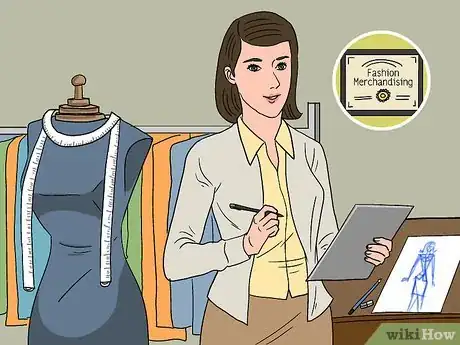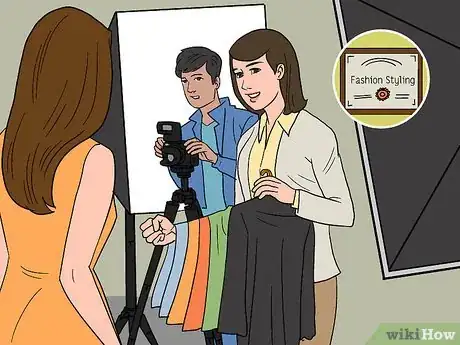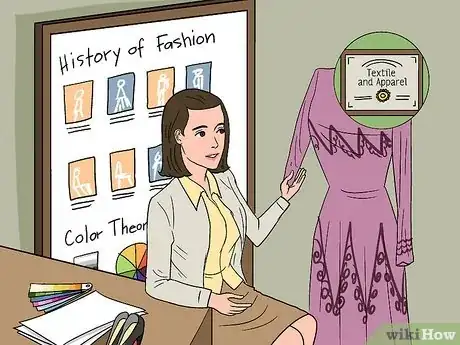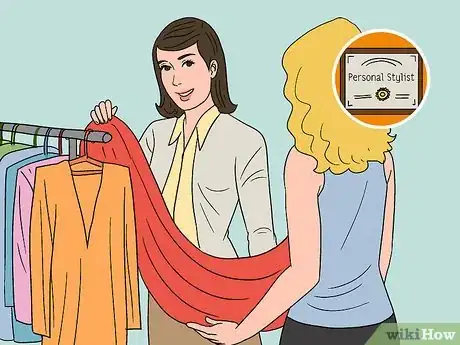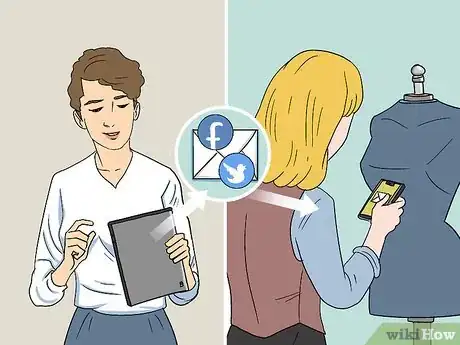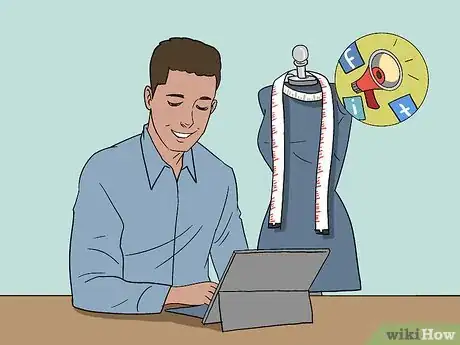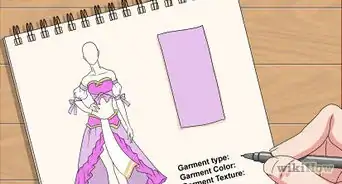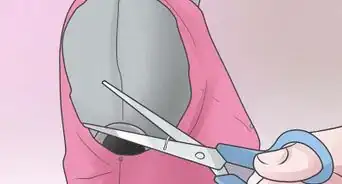This article was co-authored by Tavia Sharp and by wikiHow staff writer, Hannah Madden. Tavia Sharp is a Certified Image Consultant and the Founder of Styled Sharp. With more than 20 years of corporate fashion experience, she specializes in helping others build a brand image through personal style, appearance, behavior, communication, and digital presence. Tavia holds a BS in Fashion and Apparel Design from The University of Delaware and has her Corporate Consultant Certification from The Academy of Image Mastery.
There are 13 references cited in this article, which can be found at the bottom of the page.
This article has been viewed 12,725 times.
Are you good at putting together outfits and accessories? Do you stay on top of fashion trends in the media? Do you think that you could pick out looks for other people? If you answered yes, you might be interested in becoming a stylist. There are many different ways to become a stylist, and many paths you can take to start your career. If you build your portfolio, gain experience, and network effectively, you can be styling others in no time.
Steps
Getting a Degree
-
1Get a 4 year degree in Fashion Merchandising for a marketing approach. If you’d like to work in a marketing setting, get a degree in fashion merchandising to learn about trends in fashion, how clothes are made and marketed, advertising, and manufacturing. This degree will give you a look behind the scenes of the stylist world.[1]
- Usually, this degree takes 4 years to complete, but some colleges might have 2 year programs.
-
2Graduate with a 2 to 4 year Fashion Styling degree for a stylistic focus. This degree will teach you how to put together looks and outfits based on your fashion idea or concept. Usually, you will be able to get hands-on experience on photo shoots and model dressings through this degree.[2]
- A 4 year degree will give you more experience in fashion styling.
Advertisement -
3Obtain a 2 year Textile and Apparel degree to have a visual and merchandise education. This degree will also give you a peek into the retail market of fashion. You’ll learn about the history of fashion, color theory, visual display techniques, and more.[3]
Tip: If you are interested in making your own clothes, this degree is for you.
-
4Get a 2 year Personal Stylist degree for a one-person focus. If you’d like to be a personal shopper or styling assistant to one specific person, consider getting a personal stylist degree. You’ll learn about fashion trends, both in the past and predicting the future, and how to apply them to specific people with different tastes and livelihoods.
Gaining Experience and Networking
-
1Get an internship to gain experience. Like most jobs, you might have to start out as an unpaid intern to gain skills and industry secrets in the fashion world. Look around for corporations or stylists near you that need people to do menial tasks, like getting coffee or ironing clothes. It’s much easier to get an actual job after you’ve had experience.[4]
Tip: Try to look for internships at a fashion magazine, assisting a professional stylist, or with a photographer or production company.
-
2Look for job openings online. Large corporations will often post entry level job positions that you can apply for, like assistants or internships. You may not get the first one that you apply for, so send your resume to multiple potential employers at a time to see what sticks.
- Check out websites like https://www.monster.com and https://www.indeed.com/ to search for stylist jobs near you.
-
3Reach out to a stylist through social media. If there is a particular stylist that you’d like to work for, try contacting them through their social media platforms to see if they have any job openings available. You might have to offer your services for free to start, but once your foot is in the door, it will be much easier to get a paid position.[5]
- Try not to be too pushy when offering your help, and don’t be discouraged if the answer is no.
-
4Build a fashion portfolio to show off your work. As you gain experience through school or on the job, you can compile a portfolio to represent yourself as a stylist. Create a physical copy and a digital copy of your portfolio so you have one to take with you in person and one to send out online. Try to put together pictures of projects you have done that show a diverse and non-traditional skill set.[6]
- Select your strongest pieces to include in your portfolio. Remember, you are representing yourself, so you should put your best foot forward.
-
5Attend fashion events to network with other stylists. Events like fashion shows are open to the public and usually have tickets available to purchase.[7] Many stylists, both big and small, go to fashion events, and you might be able to talk to someone who has an opportunity for you.[8]
- New York fashion week is one of the most popular fashion events in America. Try to nab tickets early to large events like this to guarantee your spot.
Starting Your Own Business
-
1Take business classes to learn how to run your business. Starting and upkeeping a business is no small task, so if you don’t have any experience in it, you might want to take some classes. You’ll learn how to stay profitable, manage clients, and keep a work-life balance to make running your business easier.[9]
Tip: Check with your local community college to see if they have any business courses you can take.
-
2Build up your online presence. Many people use the internet to search for things that they’re interested in, and finding a stylist is no exception. Set up social media accounts, a website, and monitor your email inbox closely in case someone tries to get in contact with you about your services. You can also link your digital portfolio on your website so people can check out your work.[10] [11]
- Social media is another good way to network with other stylists.
- As you get started, try to figure out what your niche is. What does your ideal client look like?[12]
-
3
-
4Gain new clients through referrals. As you start your business, you may need to get new clients through referrals from your friends or family. Ask people in your life if they or someone they know needs your services. You can even offer them a discounted rate.[15]
- Try not to be too pushy when you ask around. Some people might not want or need a stylist, and that’s okay.
-
5Increase your prices after you gain 1 to 2 years of experience. When you start out, you may have to charge less for your services than you think they are worth. As you gain experience and clients, you can up your prices to reflect that.[16]
- Celebrity stylists can make up to $2,000 a day after they’ve had years of experience.
Expert Q&A
-
QuestionHow do you become a successful celebrity stylist?
 Tavia SharpTavia Sharp is a Certified Image Consultant and the Founder of Styled Sharp. With more than 20 years of corporate fashion experience, she specializes in helping others build a brand image through personal style, appearance, behavior, communication, and digital presence. Tavia holds a BS in Fashion and Apparel Design from The University of Delaware and has her Corporate Consultant Certification from The Academy of Image Mastery.
Tavia SharpTavia Sharp is a Certified Image Consultant and the Founder of Styled Sharp. With more than 20 years of corporate fashion experience, she specializes in helping others build a brand image through personal style, appearance, behavior, communication, and digital presence. Tavia holds a BS in Fashion and Apparel Design from The University of Delaware and has her Corporate Consultant Certification from The Academy of Image Mastery.
Certified Image Consultant Networking is key! You need to focus on meeting and connecting with people, creating a social media presence, and building your own personal brand online. This is a great way to build credibility.
Networking is key! You need to focus on meeting and connecting with people, creating a social media presence, and building your own personal brand online. This is a great way to build credibility. -
QuestionWhat qualifications do you need to be a stylist?
 Tavia SharpTavia Sharp is a Certified Image Consultant and the Founder of Styled Sharp. With more than 20 years of corporate fashion experience, she specializes in helping others build a brand image through personal style, appearance, behavior, communication, and digital presence. Tavia holds a BS in Fashion and Apparel Design from The University of Delaware and has her Corporate Consultant Certification from The Academy of Image Mastery.
Tavia SharpTavia Sharp is a Certified Image Consultant and the Founder of Styled Sharp. With more than 20 years of corporate fashion experience, she specializes in helping others build a brand image through personal style, appearance, behavior, communication, and digital presence. Tavia holds a BS in Fashion and Apparel Design from The University of Delaware and has her Corporate Consultant Certification from The Academy of Image Mastery.
Certified Image Consultant Stylists need to be in the know about what trends are out there, what brands carry certain clothing, and what styles are out there. This way, you can make the best possible recommendations for your clients.
Stylists need to be in the know about what trends are out there, what brands carry certain clothing, and what styles are out there. This way, you can make the best possible recommendations for your clients.
References
- ↑ https://www.teenvogue.com/story/how-to-be-celebrity-stylist
- ↑ https://www.academyart.edu/degree/fashion-styling/
- ↑ https://www.mesacc.edu/programs/detail/textile-and-apparel-fashion-stylist-ccl
- ↑ https://www.refinery29.com/en-us/nyc-internship-guide
- ↑ https://www.youtube.com/watch?v=uQaCv38e89w&feature=youtu.be&t=269
- ↑ https://www.businessoffashion.com/articles/education/how-to-build-an-effective-creative-portfolio
- ↑ Tavia Sharp. Certified Image Consultant. Expert Interview. 26 August 2021.
- ↑ https://www.forbes.com/sites/angelalei/2016/02/16/how-to-attend-fashion-week-like-a-pro/#5852f31e9110
- ↑ https://www.inc.com/magazine/19971201/1372.html
- ↑ https://smallbiztrends.com/2014/07/personal-stylist-business.html
- ↑ Tavia Sharp. Certified Image Consultant. Expert Interview. 26 August 2021.
- ↑ Tavia Sharp. Certified Image Consultant. Expert Interview. 26 August 2021.
- ↑ https://www.thetalko.com/websites-that-will-keep-you-on-top-of-the-latest-fashion-trends/
- ↑ Tavia Sharp. Certified Image Consultant. Expert Interview. 26 August 2021.
- ↑ https://www.splendry.com/living/work/how-to-get-started-as-a-fashion-stylist/
- ↑ https://www.designhill.com/design-blog/top-10-tips-on-starting-a-successful-fashion-design-business/
